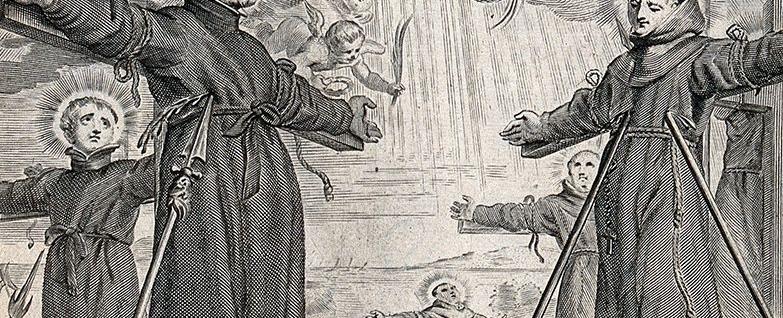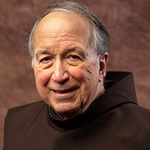Memorializing the First Japanese Martyrs

The recently-released film Silence by Martin Scorsese, based upon a 1966 historical novel by Sh?saku End?, has drawn attention to the beginnings of Christianity in Japan. On February 6 we celebrate the memory of the first Japanese martyrs - 26 Franciscans and Jesuits crucified at Nagasaki in 1597. Although in the larger Church they are honored under the name of one of the Jesuits as St. Paul Miki and Companions, 23 of these martyrs were Franciscans. As you can see in the painting, six were Franciscan friar missionaries, headed by the Spaniard, Peter Baptist; besides three other friars from Spain, the group included a friar from Mexico, Felipe de Jesus, and one from India, Gonsalo Garcia.
The other Franciscans were 17 native Japanese Secular Franciscans, including two young boys (12 and 13 years of age). In the universal liturgical calendar, this feast singles out Paul Miki, who as a Jesuit in training, was the "highest ranking," ecclesiastically speaking, of the native Japanese martyrs; in the Franciscan family, however, we honor them under the name of Sts. Peter Baptist and companions.
These Franciscans and Jesuits all suffered for being Christian. At the time of their martyrdom there were perhaps 250,000 Christians in Japan. The Jesuits had been there longer - since Francis Xavier arrived in 1549 - and pursued a strategy of strategic inculturation -- trying to reach first the more educated Japanese; when the Franciscans arrived in 1593 they immediately began working with lepers and other marginalized people at the bottom of Japanese society. Both of these strategies were effective in drawing people to become Christian. Despite this setback in 1597, Christianity continued to expand until 1614 until there were perhaps 400,000 Catholics in the country. That year a vigorously anti-Christian edict launched a campaign of torture and methods of slow death to compel people to give up the new faith. The film Silence is set during this period. These persecutions lasted for the next 25 years, and the few remaining Christians in Japan went underground for the next two centuries.
Today, let us remember the encouragement of St. Francis to his brothers and sisters who bring the Gospel to others: "All of them, wherever they may be, should remember that they gave themselves and abandoned their bodies to the Lord Jesus Christ. And for love of him, they must make themselves vulnerable to their enemies, because the Lord says, 'Whoever loses his life for my sake will save it. . . and blessed are those who suffer persecution for the sake of justice, for the kingdom of heaven is theirs'" (Earlier Rule, 16.10-12).
The other Franciscans were 17 native Japanese Secular Franciscans, including two young boys (12 and 13 years of age). In the universal liturgical calendar, this feast singles out Paul Miki, who as a Jesuit in training, was the "highest ranking," ecclesiastically speaking, of the native Japanese martyrs; in the Franciscan family, however, we honor them under the name of Sts. Peter Baptist and companions.
These Franciscans and Jesuits all suffered for being Christian. At the time of their martyrdom there were perhaps 250,000 Christians in Japan. The Jesuits had been there longer - since Francis Xavier arrived in 1549 - and pursued a strategy of strategic inculturation -- trying to reach first the more educated Japanese; when the Franciscans arrived in 1593 they immediately began working with lepers and other marginalized people at the bottom of Japanese society. Both of these strategies were effective in drawing people to become Christian. Despite this setback in 1597, Christianity continued to expand until 1614 until there were perhaps 400,000 Catholics in the country. That year a vigorously anti-Christian edict launched a campaign of torture and methods of slow death to compel people to give up the new faith. The film Silence is set during this period. These persecutions lasted for the next 25 years, and the few remaining Christians in Japan went underground for the next two centuries.
Today, let us remember the encouragement of St. Francis to his brothers and sisters who bring the Gospel to others: "All of them, wherever they may be, should remember that they gave themselves and abandoned their bodies to the Lord Jesus Christ. And for love of him, they must make themselves vulnerable to their enemies, because the Lord says, 'Whoever loses his life for my sake will save it. . . and blessed are those who suffer persecution for the sake of justice, for the kingdom of heaven is theirs'" (Earlier Rule, 16.10-12).
Dominic Monti, OFM
Professor of Franciscan Research in the Franciscan Institute of St. Bonaventure University
Dominic V. Monti, OFM, is a Franciscan Friar of Holy Name Province (USA) and currently professor of Franciscan Research in the Franciscan Institute of St. Bonaventure University. He devoted the greater part of his ministry to teaching the History of Christianity, in particular the history of the Franciscan movement. He has contributed two volumes to the Works of St. Bonaventure series and is author of Francis & His Brothers, a popular history of the Friars Minor.

